Deck 11: Vectors and the Geometry of Space
Question
Question
Question
Question
Question
Question
Question
Question
Question
Question
Question
Question
Question
Question
Question
Question
Question
Question
Question
Question
Question
Question
Question
Question
Question
Question
Question
Question
Question
Question
Question
Question
Question
Question
Question
Question
Question
Question
Question
Question
Question
Question
Question
Question
Question
Question
Question
Question
Question
Question
Question
Question
Question
Question
Question
Question
Question
Question
Question
Question
Question
Question
Question
Question
Question
Question
Question
Question
Question
Question
Question
Question
Question
Question
Question
Question
Question
Question
Question
Question

Unlock Deck
Sign up to unlock the cards in this deck!
Unlock Deck
Unlock Deck
1/130
Play
Full screen (f)
Deck 11: Vectors and the Geometry of Space
1
Identify the following quadric surface. 
A) hyperboloid of two sheets
B) elliptic cone
C) ellipsoid
D) elliptic paraboloid
E) hyperboloid of one sheet

A) hyperboloid of two sheets
B) elliptic cone
C) ellipsoid
D) elliptic paraboloid
E) hyperboloid of one sheet
E
2
Find the magnitude of the vector v given its initial and terminal points. Round your answer to four decimal places. Initial point: (3, -3, -4)
Terminal point: (8, -7, -1)
A) or 7.2801
or 7.2801
B) or 7.6158
or 7.6158
C) or 7.0711
or 7.0711
D) or 4.3589
or 4.3589
E) or 7.8102
or 7.8102
Terminal point: (8, -7, -1)
A)
 or 7.2801
or 7.2801B)
 or 7.6158
or 7.6158C)
 or 7.0711
or 7.0711D)
 or 4.3589
or 4.3589E)
 or 7.8102
or 7.8102C
3
Identify the equation (written in terms of cylindrical or spherical coordinates) of the following graph. 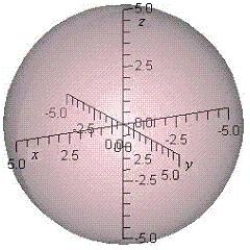
A)
B)
C)
D)
E)

A)

B)

C)

D)

E)

C
4
Find an equation in cylindrical coordinates for the equation given in rectangular coordinates. 
A)
B)
C)
D)
E)

A)

B)

C)

D)

E)


Unlock Deck
Unlock for access to all 130 flashcards in this deck.
Unlock Deck
k this deck
5
Find the standard equation of a sphere that has diameter with the end points given below. (4, 8, 3), (2, 4, 7)
A)
B)
C)
D)
E)
A)

B)

C)

D)

E)


Unlock Deck
Unlock for access to all 130 flashcards in this deck.
Unlock Deck
k this deck
6
Find the magnitude of the vector given below. Round your answer to four decimal places. 
A)
B)
C)
D)
E)

A)

B)

C)

D)

E)


Unlock Deck
Unlock for access to all 130 flashcards in this deck.
Unlock Deck
k this deck
7
Find the vector v with the magnitude  and direction of
and direction of  .
.
A)
B)
C)
D)
E)
 and direction of
and direction of  .
.
A)

B)

C)

D)

E)


Unlock Deck
Unlock for access to all 130 flashcards in this deck.
Unlock Deck
k this deck
8
Complete the square to write the following equation in the standard form for a sphere. 
A)
B)
C)
D)
E)

A)

B)

C)

D)

E)


Unlock Deck
Unlock for access to all 130 flashcards in this deck.
Unlock Deck
k this deck
9
A chute at the top of a grain elevator of a combine funnels the grain into a bin (see figure). Find the angle between two adjacent sides. Round your answer to one decimal place. 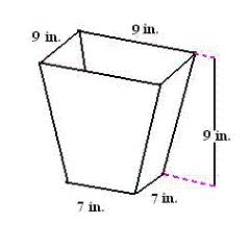
A) 83.7
B) 91.6
C) 90.7
D) 86.4
E) 181.6

A) 83.7

B) 91.6

C) 90.7

D) 86.4

E) 181.6


Unlock Deck
Unlock for access to all 130 flashcards in this deck.
Unlock Deck
k this deck
10
Find the distance between the points given below.
(3, 1, 4 ), ( 6, 6, 7 )
A) or 6.5574 to four decimal places.
or 6.5574 to four decimal places.
B) or 6.4807 to four decimal places.
or 6.4807 to four decimal places.
C) or 6.6332 to four decimal places.
or 6.6332 to four decimal places.
D) or 6.0828 to four decimal places.
or 6.0828 to four decimal places.
E) or 6.7082 to four decimal places.
or 6.7082 to four decimal places.
(3, 1, 4 ), ( 6, 6, 7 )
A)
 or 6.5574 to four decimal places.
or 6.5574 to four decimal places.B)
 or 6.4807 to four decimal places.
or 6.4807 to four decimal places.C)
 or 6.6332 to four decimal places.
or 6.6332 to four decimal places.D)
 or 6.0828 to four decimal places.
or 6.0828 to four decimal places.E)
 or 6.7082 to four decimal places.
or 6.7082 to four decimal places.
Unlock Deck
Unlock for access to all 130 flashcards in this deck.
Unlock Deck
k this deck
11
Identify the equation of the following graph. 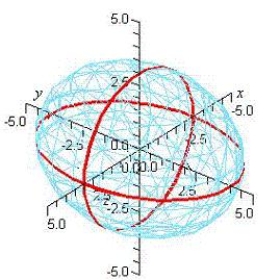
A)
B)
C)
D)
E)

A)

B)

C)

D)

E)


Unlock Deck
Unlock for access to all 130 flashcards in this deck.
Unlock Deck
k this deck
12
Sketch the graph of the cross product of the unit vector  .
.
A)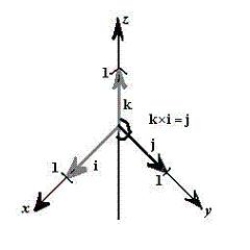
B)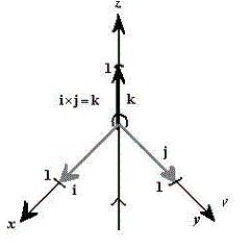
C)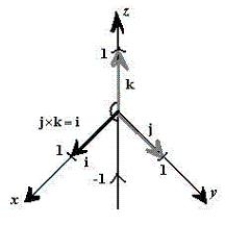
D)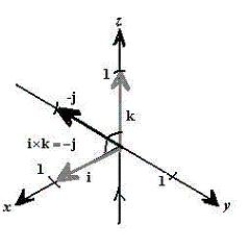
E)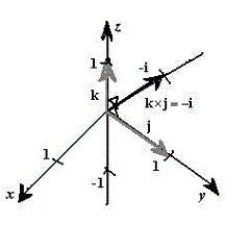
 .
. A)

B)

C)

D)

E)


Unlock Deck
Unlock for access to all 130 flashcards in this deck.
Unlock Deck
k this deck
13
Find the standard equation of the sphere with center (4, 1, 1), and radius 2.
A)
B)
C)
D)
E)
A)

B)

C)

D)

E)


Unlock Deck
Unlock for access to all 130 flashcards in this deck.
Unlock Deck
k this deck
14
Identify the equation (written in terms of cylindrical or spherical coordinates) of the following graph. 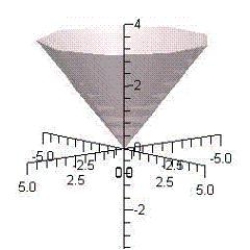
A)
B)
C)
D)
E)

A)

B)

C)

D)

E)


Unlock Deck
Unlock for access to all 130 flashcards in this deck.
Unlock Deck
k this deck
15
Graph the solid described in spherical coordinates. 
A) 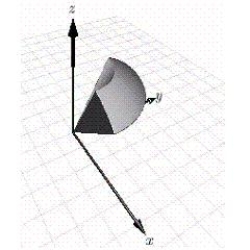
B) 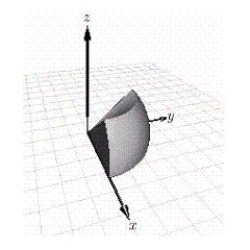
C) 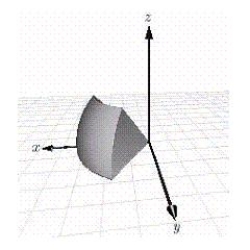
D) 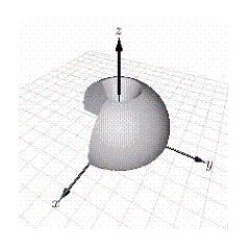
E) 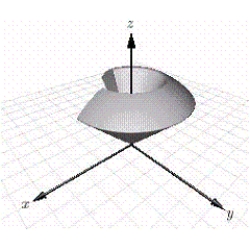

A)

B)

C)

D)

E)


Unlock Deck
Unlock for access to all 130 flashcards in this deck.
Unlock Deck
k this deck
16
Determine whether u and v are orthogonal, parallel and pointing in the same direction, parallel and pointing in opposite directions, or neither. 
A) Neither parallel nor orthogonal
B) Parallel, same direction
C) Orthogonal
D) Parallel, opposite direction

A) Neither parallel nor orthogonal
B) Parallel, same direction
C) Orthogonal
D) Parallel, opposite direction

Unlock Deck
Unlock for access to all 130 flashcards in this deck.
Unlock Deck
k this deck
17
Find the component form of the vector u with the given initial and terminal points. Initial point: (2, 1, 1 )
Terminal point: (7 , 10 , 3 )
A)
B)
C)
D)
E)
Terminal point: (7 , 10 , 3 )
A)

B)

C)

D)

E)


Unlock Deck
Unlock for access to all 130 flashcards in this deck.
Unlock Deck
k this deck
18
Find a set of parametric equations of the line that passes through the point  and is parallel to the xy-plane and yz-plane.
and is parallel to the xy-plane and yz-plane.
A)
B)
C)
D)
E)
 and is parallel to the xy-plane and yz-plane.
and is parallel to the xy-plane and yz-plane.A)

B)

C)

D)

E)


Unlock Deck
Unlock for access to all 130 flashcards in this deck.
Unlock Deck
k this deck
19
Find the standard equation of the sphere with center at  and tangent to the yz-plane.
and tangent to the yz-plane.
A)
B)
C)
D)
E)
 and tangent to the yz-plane.
and tangent to the yz-plane.A)

B)

C)

D)

E)


Unlock Deck
Unlock for access to all 130 flashcards in this deck.
Unlock Deck
k this deck
20
Identify the equation of the following graph. 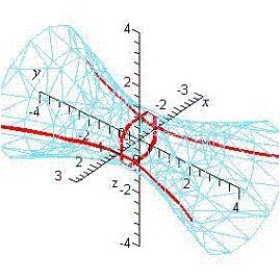
A)
B)
C)
D)
E)

A)

B)

C)

D)

E)


Unlock Deck
Unlock for access to all 130 flashcards in this deck.
Unlock Deck
k this deck
21
The vector v and its initial point is given. Find the terminal point.  , initial point
, initial point 
A)
B)
C)
D)
E)
 , initial point
, initial point 
A)

B)

C)

D)

E)


Unlock Deck
Unlock for access to all 130 flashcards in this deck.
Unlock Deck
k this deck
22
The top of a rubber bushing designed to absorb vibrations in an automobile is the surface of revolution generated by revolving the curve  in the yz-plane about the z-axis. The bushing has a hole of 1 centimeter in diameter through its center and parallel to the axis of revolution. All measurements are in centimeters and the bushing is set on the xy-plane. Find the volume of the rubber bushing. Round your answer to two decimal places.
in the yz-plane about the z-axis. The bushing has a hole of 1 centimeter in diameter through its center and parallel to the axis of revolution. All measurements are in centimeters and the bushing is set on the xy-plane. Find the volume of the rubber bushing. Round your answer to two decimal places.
A)
B)
C)
D)
E)
 in the yz-plane about the z-axis. The bushing has a hole of 1 centimeter in diameter through its center and parallel to the axis of revolution. All measurements are in centimeters and the bushing is set on the xy-plane. Find the volume of the rubber bushing. Round your answer to two decimal places.
in the yz-plane about the z-axis. The bushing has a hole of 1 centimeter in diameter through its center and parallel to the axis of revolution. All measurements are in centimeters and the bushing is set on the xy-plane. Find the volume of the rubber bushing. Round your answer to two decimal places. A)

B)

C)

D)

E)


Unlock Deck
Unlock for access to all 130 flashcards in this deck.
Unlock Deck
k this deck
23
To carry a 100-pound cylindrical weight, two workers lift on the ends of short ropes tied to an eyelet on the top center of the cylinder. One rope makes a  angle away from the vertical and the other makes a
angle away from the vertical and the other makes a  angle as shown in the figure below. Find each rope's tension if the resultant force is vertical.Round your answer to two decimal places.
angle as shown in the figure below. Find each rope's tension if the resultant force is vertical.Round your answer to two decimal places. 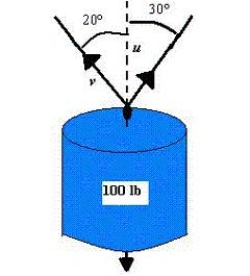
A)
B)
C)
D)
E)
 angle away from the vertical and the other makes a
angle away from the vertical and the other makes a  angle as shown in the figure below. Find each rope's tension if the resultant force is vertical.Round your answer to two decimal places.
angle as shown in the figure below. Find each rope's tension if the resultant force is vertical.Round your answer to two decimal places. 
A)

B)

C)

D)

E)


Unlock Deck
Unlock for access to all 130 flashcards in this deck.
Unlock Deck
k this deck
24
Find a unit vector that is orthogonal to both  and
and  .
.
A)
B)
C)
D)
E)
 and
and  .
.A)

B)

C)

D)

E)


Unlock Deck
Unlock for access to all 130 flashcards in this deck.
Unlock Deck
k this deck
25
Find the distance between the point  and the plane
and the plane  .
.
A)
B)
C)
D)
E)
 and the plane
and the plane  .
.A)

B)

C)

D)

E)


Unlock Deck
Unlock for access to all 130 flashcards in this deck.
Unlock Deck
k this deck
26
Find the triple scalar product  .
. 
A)
B)
C)
D)
E)
 .
. 
A)

B)

C)

D)

E)


Unlock Deck
Unlock for access to all 130 flashcards in this deck.
Unlock Deck
k this deck
27
Suppose a car is towed using a force of 1300 newtons. The chain used to pull the car makes a  angle with the horizontal. Find the work done in towing the car 3 kilometers. Round your answer to two decimal places.
angle with the horizontal. Find the work done in towing the car 3 kilometers. Round your answer to two decimal places.
A) 7,070.20 km-N
B) 3,534.60 km-N
C) 3,549.60 km-N
D) 7,068.20 km-N
E) 1,648.21 km-N
 angle with the horizontal. Find the work done in towing the car 3 kilometers. Round your answer to two decimal places.
angle with the horizontal. Find the work done in towing the car 3 kilometers. Round your answer to two decimal places.A) 7,070.20 km-N
B) 3,534.60 km-N
C) 3,549.60 km-N
D) 7,068.20 km-N
E) 1,648.21 km-N

Unlock Deck
Unlock for access to all 130 flashcards in this deck.
Unlock Deck
k this deck
28
Find the area of a parallelogram that has the given vectors as adjacent sides. Round your answer to two decimal places. 
A)
B)
C)
D)
E)

A)

B)

C)

D)

E)


Unlock Deck
Unlock for access to all 130 flashcards in this deck.
Unlock Deck
k this deck
29
Given  and
and  , find
, find  .
.
A)
B)
C)
D)
E)
 and
and  , find
, find  .
. A)

B)

C)

D)

E)


Unlock Deck
Unlock for access to all 130 flashcards in this deck.
Unlock Deck
k this deck
30
Three forces with magnitudes  pounds,
pounds,  pounds and
pounds and  pounds act on an object at angles
pounds act on an object at angles  ,
,  , and
, and  respectively, with the positive x-axis. Find the direction and magnitude of the resultant force. (The choices below are given to two decimal places.)
respectively, with the positive x-axis. Find the direction and magnitude of the resultant force. (The choices below are given to two decimal places.)
A) pounds at an angle of
pounds at an angle of  with the positive x-axis
with the positive x-axis
B) pounds at an angle of
pounds at an angle of  with the positive x-axis
with the positive x-axis
C) pounds at an angle of
pounds at an angle of  with the positive x-axis
with the positive x-axis
D) pounds at an angle of
pounds at an angle of  with the positive x-axis
with the positive x-axis
E) pounds at an angle of
pounds at an angle of  with the positive x-axis
with the positive x-axis
 pounds,
pounds,  pounds and
pounds and  pounds act on an object at angles
pounds act on an object at angles  ,
,  , and
, and  respectively, with the positive x-axis. Find the direction and magnitude of the resultant force. (The choices below are given to two decimal places.)
respectively, with the positive x-axis. Find the direction and magnitude of the resultant force. (The choices below are given to two decimal places.)A)
 pounds at an angle of
pounds at an angle of  with the positive x-axis
with the positive x-axisB)
 pounds at an angle of
pounds at an angle of  with the positive x-axis
with the positive x-axisC)
 pounds at an angle of
pounds at an angle of  with the positive x-axis
with the positive x-axisD)
 pounds at an angle of
pounds at an angle of  with the positive x-axis
with the positive x-axisE)
 pounds at an angle of
pounds at an angle of  with the positive x-axis
with the positive x-axis
Unlock Deck
Unlock for access to all 130 flashcards in this deck.
Unlock Deck
k this deck
31
Identify the following quadric surface. 
A) hyperboloid of one sheet
B) elliptic cone
C) elliptic paraboloid
D) hyperboloid of two sheets
E) hyperbolic paraboloid

A) hyperboloid of one sheet
B) elliptic cone
C) elliptic paraboloid
D) hyperboloid of two sheets
E) hyperbolic paraboloid

Unlock Deck
Unlock for access to all 130 flashcards in this deck.
Unlock Deck
k this deck
32
Find an equation of a plane passing through the following three points. 
A)
B)
C)
D)
E)

A)

B)

C)

D)

E)


Unlock Deck
Unlock for access to all 130 flashcards in this deck.
Unlock Deck
k this deck
33
The top of a rubber bushing designed to absorb vibrations in an automobile is the surface of revolution generated by revolving the curve  in the yz-plane about the z-axis. All measurements are in centimeters and the bushing is set on the xy-plane. Use the shell method to find its volume. Round your answer to one decimal place.
in the yz-plane about the z-axis. All measurements are in centimeters and the bushing is set on the xy-plane. Use the shell method to find its volume. Round your answer to one decimal place.
A)
B)
C)
D)
E)
 in the yz-plane about the z-axis. All measurements are in centimeters and the bushing is set on the xy-plane. Use the shell method to find its volume. Round your answer to one decimal place.
in the yz-plane about the z-axis. All measurements are in centimeters and the bushing is set on the xy-plane. Use the shell method to find its volume. Round your answer to one decimal place. A)

B)

C)

D)

E)


Unlock Deck
Unlock for access to all 130 flashcards in this deck.
Unlock Deck
k this deck
34
Find the set of parametric equations of the line through the point  that is parallel to the line
that is parallel to the line  and
and  .
.
A)
B)
C)
D)
E)
 that is parallel to the line
that is parallel to the line  and
and  .
. A)

B)

C)

D)

E)


Unlock Deck
Unlock for access to all 130 flashcards in this deck.
Unlock Deck
k this deck
35
The top of a rubber bushing designed to absorb vibrations in an automobile is the surface of revolution generated by revolving the curve  in the yz-plane about the z-axis. Find an equation for the surface of revolution.
in the yz-plane about the z-axis. Find an equation for the surface of revolution.
A)
B)
C)
D)
E)
 in the yz-plane about the z-axis. Find an equation for the surface of revolution.
in the yz-plane about the z-axis. Find an equation for the surface of revolution.A)

B)

C)

D)

E)


Unlock Deck
Unlock for access to all 130 flashcards in this deck.
Unlock Deck
k this deck
36
Some planet is an oblate ellipsoid rather than a sphere because of the forces caused by its rotation. The equatorial radius of this planet is 4851 miles and the polar radius is 4660 miles. Find the equation of the ellipsoid. (Assume that the center of a planet is at the origin and that the trace formed by the plane  corresponds to the equator.)
corresponds to the equator.)
A)
B)
C)
D)
E)
 corresponds to the equator.)
corresponds to the equator.)A)

B)

C)

D)

E)


Unlock Deck
Unlock for access to all 130 flashcards in this deck.
Unlock Deck
k this deck
37
Two insects are crawling along different lines in three-space. At time t (in minutes), the first insect is at the point  where
where  . Also, at time t, the second insect is at the point
. Also, at time t, the second insect is at the point  where
where  . Assume distances are given in inches. Find the distance between the two insects at time
. Assume distances are given in inches. Find the distance between the two insects at time  . Round your answer to two decimal places.
. Round your answer to two decimal places.
A) inches
inches
B) inches
inches
C) inches
inches
D) inches
inches
E) inches
inches
 where
where  . Also, at time t, the second insect is at the point
. Also, at time t, the second insect is at the point  where
where  . Assume distances are given in inches. Find the distance between the two insects at time
. Assume distances are given in inches. Find the distance between the two insects at time  . Round your answer to two decimal places.
. Round your answer to two decimal places.A)
 inches
inchesB)
 inches
inchesC)
 inches
inchesD)
 inches
inchesE)
 inches
inches
Unlock Deck
Unlock for access to all 130 flashcards in this deck.
Unlock Deck
k this deck
38
Identify the following quadric surface. 
A) hyperboloid of one sheet
B) elliptic cone
C) hyperboloid of two sheets
D) elliptic paraboloid
E) ellipsoid

A) hyperboloid of one sheet
B) elliptic cone
C) hyperboloid of two sheets
D) elliptic paraboloid
E) ellipsoid

Unlock Deck
Unlock for access to all 130 flashcards in this deck.
Unlock Deck
k this deck
39
Suppose a plane is flying in the direction  (relative to the west). Its speed with respect to the air is 600 kilometers per hour. The wind at the plane's altitude is from the southwest at 80 kilometers per hour (see figure). What is its speed with respect to the ground? Round your answer to one decimal place.
(relative to the west). Its speed with respect to the air is 600 kilometers per hour. The wind at the plane's altitude is from the southwest at 80 kilometers per hour (see figure). What is its speed with respect to the ground? Round your answer to one decimal place. 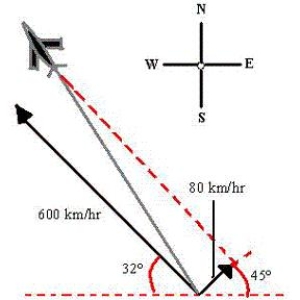
A)
B)
C)
D)
E)
 (relative to the west). Its speed with respect to the air is 600 kilometers per hour. The wind at the plane's altitude is from the southwest at 80 kilometers per hour (see figure). What is its speed with respect to the ground? Round your answer to one decimal place.
(relative to the west). Its speed with respect to the air is 600 kilometers per hour. The wind at the plane's altitude is from the southwest at 80 kilometers per hour (see figure). What is its speed with respect to the ground? Round your answer to one decimal place. 
A)

B)

C)

D)

E)


Unlock Deck
Unlock for access to all 130 flashcards in this deck.
Unlock Deck
k this deck
40
Given  , find
, find  .
.
A)
B)
C)
D)
E)
 , find
, find  .
.A)

B)

C)

D)

E)


Unlock Deck
Unlock for access to all 130 flashcards in this deck.
Unlock Deck
k this deck
41
Find vectors u and v whose initial and terminal points are given. Determine whether u and v are equivalent.
U: (4,2), (7,6) v: (-2,3), (1,7)
A) , which are equivalent
, which are equivalent
B) , which are not equivalent
, which are not equivalent
C) , which are equivalent
, which are equivalent
D) , which are equivalent
, which are equivalent
E) , which are equivalent
, which are equivalent
U: (4,2), (7,6) v: (-2,3), (1,7)
A)
 , which are equivalent
, which are equivalentB)
 , which are not equivalent
, which are not equivalentC)
 , which are equivalent
, which are equivalentD)
 , which are equivalent
, which are equivalentE)
 , which are equivalent
, which are equivalent
Unlock Deck
Unlock for access to all 130 flashcards in this deck.
Unlock Deck
k this deck
42
Convert the point  from rectangular coordinates to spherical coordinates.
from rectangular coordinates to spherical coordinates.
A)
B)
C)
D)
E)
 from rectangular coordinates to spherical coordinates.
from rectangular coordinates to spherical coordinates.A)

B)

C)

D)

E)


Unlock Deck
Unlock for access to all 130 flashcards in this deck.
Unlock Deck
k this deck
43
Find the equation of the surface satisfying the conditions, and identify the surface. The set of points equidistant from the point (-4, 3, 2 ) and the plane  .
.
A) , an elliptic paraboloid
, an elliptic paraboloid
B) , a sphere
, a sphere
C) , a hyperbolic paraboloid
, a hyperbolic paraboloid
D) , a sphere
, a sphere
E) , a hyperbolic paraboloid
, a hyperbolic paraboloid
 .
.A)
 , an elliptic paraboloid
, an elliptic paraboloidB)
 , a sphere
, a sphereC)
 , a hyperbolic paraboloid
, a hyperbolic paraboloidD)
 , a sphere
, a sphereE)
 , a hyperbolic paraboloid
, a hyperbolic paraboloid
Unlock Deck
Unlock for access to all 130 flashcards in this deck.
Unlock Deck
k this deck
44
An object is pulled 5 feet horizontally across a floor, using a force of 65 pounds. The direction of the force is  above the horizontal. Find the work done. Round your answer to two decimal places.
above the horizontal. Find the work done. Round your answer to two decimal places.
A) 294.55 ft-lb
B) 322.14 ft-lb
C) 137.35 ft-lb
D) 5.62 ft-lb
E) 336.74 ft-lb
 above the horizontal. Find the work done. Round your answer to two decimal places.
above the horizontal. Find the work done. Round your answer to two decimal places.A) 294.55 ft-lb
B) 322.14 ft-lb
C) 137.35 ft-lb
D) 5.62 ft-lb
E) 336.74 ft-lb

Unlock Deck
Unlock for access to all 130 flashcards in this deck.
Unlock Deck
k this deck
45
Find a set of symmetric equations of the line through the points  and
and  .
.
A)
B)
C)
D)
E)
 and
and  .
.A)

B)

C)

D)

E)


Unlock Deck
Unlock for access to all 130 flashcards in this deck.
Unlock Deck
k this deck
46
Convert the point from spherical coordinates to rectangular coordinates. 
A)
B)
C)
D)
E)

A)

B)

C)

D)

E)


Unlock Deck
Unlock for access to all 130 flashcards in this deck.
Unlock Deck
k this deck
47
Suppose a plane is flying in the direction  . Its speed with respect to the air is 900 kilometers per hour. The wind at the plane's altitude is from the southwest at 100 kilometers per hour (see figure). What is the true direction of the plane? Round your answer to two decimal places.
. Its speed with respect to the air is 900 kilometers per hour. The wind at the plane's altitude is from the southwest at 100 kilometers per hour (see figure). What is the true direction of the plane? Round your answer to two decimal places. 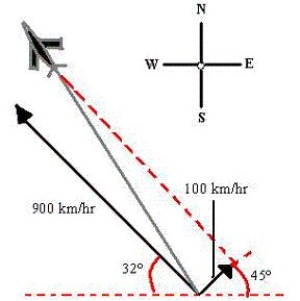
A) North of West
North of West
B) North of West
North of West
C) North of East
North of East
D) North of West
North of West
E) North of South
North of South
 . Its speed with respect to the air is 900 kilometers per hour. The wind at the plane's altitude is from the southwest at 100 kilometers per hour (see figure). What is the true direction of the plane? Round your answer to two decimal places.
. Its speed with respect to the air is 900 kilometers per hour. The wind at the plane's altitude is from the southwest at 100 kilometers per hour (see figure). What is the true direction of the plane? Round your answer to two decimal places. 
A)
 North of West
North of WestB)
 North of West
North of WestC)
 North of East
North of EastD)
 North of West
North of WestE)
 North of South
North of South
Unlock Deck
Unlock for access to all 130 flashcards in this deck.
Unlock Deck
k this deck
48
Find the area of the parallelogram with the vertices  , and
, and  . Round your answer to two decimal places.
. Round your answer to two decimal places.
A) 122.00
B) 6.00
C) 11.05
D) 12.00
E) 3.46
 , and
, and  . Round your answer to two decimal places.
. Round your answer to two decimal places.A) 122.00
B) 6.00
C) 11.05
D) 12.00
E) 3.46

Unlock Deck
Unlock for access to all 130 flashcards in this deck.
Unlock Deck
k this deck
49
Find the direction cosines of the vector u given below. 
A)
B)
C)
D)
E)

A)

B)

C)

D)

E)


Unlock Deck
Unlock for access to all 130 flashcards in this deck.
Unlock Deck
k this deck
50
Find the volume of the parallelepiped with the following vertices. 
A)
B)
C)
D)
E)

A)

B)

C)

D)

E)


Unlock Deck
Unlock for access to all 130 flashcards in this deck.
Unlock Deck
k this deck
51
Given  and
and  find
find  .
.
A)
B)
C)
D)
E)
 and
and  find
find  .
.A)

B)

C)

D)

E)


Unlock Deck
Unlock for access to all 130 flashcards in this deck.
Unlock Deck
k this deck
52
Suppose a plane flies at a constant groundspeed of 100 miles per hour due east and encounters a 40 mile-per-hour wind from the northwest. Both the airspeed and the compass direction must change to for the plane to maintain its groundspeed and eastward direction. Find the airspeed to maintain its groundspeed and eastward direction. Round your answer to two decimal places.
A)
B)
C)
D)
E)
A)

B)

C)

D)

E)


Unlock Deck
Unlock for access to all 130 flashcards in this deck.
Unlock Deck
k this deck
53
Find the coordinates of the midpoint of the line segment joining the points given below. (-6, 6, 1), (-4, 10, 11)
A) (-5, 2, 6)
B) (1, 2, 6)
C) (1, 8, 6)
D) (1, 8, 5)
E) (-5, 8, 6)
A) (-5, 2, 6)
B) (1, 2, 6)
C) (1, 8, 6)
D) (1, 8, 5)
E) (-5, 8, 6)

Unlock Deck
Unlock for access to all 130 flashcards in this deck.
Unlock Deck
k this deck
54
Find a set of symmetric equations of the line through the point  parallel to the vector
parallel to the vector  .
.
A)
B)
C)
D)
E)
 parallel to the vector
parallel to the vector  .
.A)

B)

C)

D)

E)


Unlock Deck
Unlock for access to all 130 flashcards in this deck.
Unlock Deck
k this deck
55
A child applies the brakes on a bicycle by applying a downward force of 20 pounds on the pedal when the crank makes a  angle with the horizontal (see figure). The crank is 6 inches in length. Find the torque at P. Round your answer to two decimal places.
angle with the horizontal (see figure). The crank is 6 inches in length. Find the torque at P. Round your answer to two decimal places. 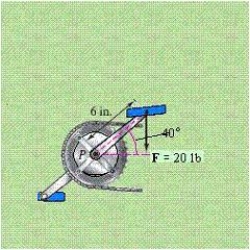
A) 15.32 ft-lb
B) 7.66 ft-lb
C) 91.93 ft-lb
D) 6.43 ft-lb
E) 12.86 ft-lb
 angle with the horizontal (see figure). The crank is 6 inches in length. Find the torque at P. Round your answer to two decimal places.
angle with the horizontal (see figure). The crank is 6 inches in length. Find the torque at P. Round your answer to two decimal places. 
A) 15.32 ft-lb
B) 7.66 ft-lb
C) 91.93 ft-lb
D) 6.43 ft-lb
E) 12.86 ft-lb

Unlock Deck
Unlock for access to all 130 flashcards in this deck.
Unlock Deck
k this deck
56
Convert the following point from cylindrical coordinates to rectangular coordinates. 
A)
B)
C)
D)
E)

A)

B)

C)

D)

E)


Unlock Deck
Unlock for access to all 130 flashcards in this deck.
Unlock Deck
k this deck
57
Suppose a plane flies at a constant groundspeed of 300 miles per hour due east and encounters a 50 mile-per-hour wind from the northwest. Both the airspeed and the compass direction must change to for the plane to maintain its groundspeed and eastward direction. Find the airspeed to maintain its groundspeed and eastward direction. Round your answer to two decimal places.
A)
B)
C)
D)
E)
A)

B)

C)

D)

E)


Unlock Deck
Unlock for access to all 130 flashcards in this deck.
Unlock Deck
k this deck
58
Determine whether the following planes are parallel, orthogonal, or neither. If they are neither parallel nor orthogonal, find the angle of intersection. 
A) The planes are neither parallel nor orthogonal, the angle of intersection is .
.
B) The planes are parallel.
C) The planes are neither parallel nor orthogonal, the angle of intersection is .
.
D) The planes are orthogonal.

A) The planes are neither parallel nor orthogonal, the angle of intersection is
 .
.B) The planes are parallel.
C) The planes are neither parallel nor orthogonal, the angle of intersection is
 .
.D) The planes are orthogonal.

Unlock Deck
Unlock for access to all 130 flashcards in this deck.
Unlock Deck
k this deck
59
Suppose a toy wagon is pulled by exerting a force of 25 pounds on a handle that makes a  angle with the horizontal as shown in the figure below. Find the work done in pulling the wagon 50 feet. Round your answer to one decimal place.
angle with the horizontal as shown in the figure below. Find the work done in pulling the wagon 50 feet. Round your answer to one decimal place. 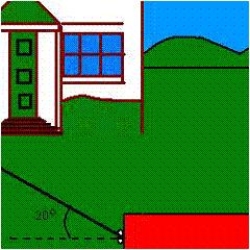
A) 1,200.0 ft-lb
B) 427.5 ft-lb
C) 2,350.2 ft-lb
D) 1,174.6 ft-lb
E) 2,348.2 ft-lb
 angle with the horizontal as shown in the figure below. Find the work done in pulling the wagon 50 feet. Round your answer to one decimal place.
angle with the horizontal as shown in the figure below. Find the work done in pulling the wagon 50 feet. Round your answer to one decimal place. 
A) 1,200.0 ft-lb
B) 427.5 ft-lb
C) 2,350.2 ft-lb
D) 1,174.6 ft-lb
E) 2,348.2 ft-lb

Unlock Deck
Unlock for access to all 130 flashcards in this deck.
Unlock Deck
k this deck
60
Find the cross product of the unit vector  .
.
A)
B)
C)
D)
E)
 .
.A)

B)

C)

D)

E)


Unlock Deck
Unlock for access to all 130 flashcards in this deck.
Unlock Deck
k this deck
61
Find the direction cosines of the vector u given below. 
A)
B)
C)
D)
E)

A)

B)

C)

D)

E)


Unlock Deck
Unlock for access to all 130 flashcards in this deck.
Unlock Deck
k this deck
62
Given the equation of a surface of revolution  , find the equation of its generating curve in the xy-plane rotating about the x-axis.
, find the equation of its generating curve in the xy-plane rotating about the x-axis.
A)
B)
C)
D)
E)
 , find the equation of its generating curve in the xy-plane rotating about the x-axis.
, find the equation of its generating curve in the xy-plane rotating about the x-axis.A)

B)

C)

D)

E)


Unlock Deck
Unlock for access to all 130 flashcards in this deck.
Unlock Deck
k this deck
63
Find a set of parametric equations of the line through the point  parallel to the vector
parallel to the vector  .
.
A)
B)
C)
D)
E)
 parallel to the vector
parallel to the vector  .
.A)

B)

C)

D)

E)


Unlock Deck
Unlock for access to all 130 flashcards in this deck.
Unlock Deck
k this deck
64
Identify the following quadric surface. 
A) elliptic paraboloid
B) elliptic cone
C) hyperboloid of two sheets
D) hyperboloid of one sheet
E) ellipsoid

A) elliptic paraboloid
B) elliptic cone
C) hyperboloid of two sheets
D) hyperboloid of one sheet
E) ellipsoid

Unlock Deck
Unlock for access to all 130 flashcards in this deck.
Unlock Deck
k this deck
65
Given  , find
, find  .
.
A) -6
B) -24
C) -5
D) 4
E) 26
 , find
, find  .
.A) -6
B) -24
C) -5
D) 4
E) 26

Unlock Deck
Unlock for access to all 130 flashcards in this deck.
Unlock Deck
k this deck
66
Given  , find
, find  .
.
A)
B)
C)
D)
E)
 , find
, find  .
.A)

B)

C)

D)

E)


Unlock Deck
Unlock for access to all 130 flashcards in this deck.
Unlock Deck
k this deck
67
Given  and
and  find
find  .
.
A)
B)
C)
D)
E)
 and
and  find
find  .
.A)

B)

C)

D)

E)


Unlock Deck
Unlock for access to all 130 flashcards in this deck.
Unlock Deck
k this deck
68
Given  and
and  find
find  .
.
A)
B)
C)
D)
E)
 and
and  find
find  .
.A)

B)

C)

D)

E)


Unlock Deck
Unlock for access to all 130 flashcards in this deck.
Unlock Deck
k this deck
69
Find the angle between the vectors for u and v given below. 
A)
B)
C)
D)
E)

A)

B)

C)

D)

E)


Unlock Deck
Unlock for access to all 130 flashcards in this deck.
Unlock Deck
k this deck
70
Find the distance between the point  and the line given by the set of parametric equations
and the line given by the set of parametric equations  .
.
A) /3
/3
B) 1
C) /3
/3
D) 3
E) /1
/1
 and the line given by the set of parametric equations
and the line given by the set of parametric equations  .
. A)
 /3
/3 B) 1
C)
 /3
/3 D) 3
E)
 /1
/1
Unlock Deck
Unlock for access to all 130 flashcards in this deck.
Unlock Deck
k this deck
71
Given  and
and  , find
, find  .
.
A)
B)
C)
D)
E)
 and
and  , find
, find  .
.A)

B)

C)

D)

E)


Unlock Deck
Unlock for access to all 130 flashcards in this deck.
Unlock Deck
k this deck
72
Find a set of parametric equations of the line through the points  and
and  .
.
A)
B)
C)
D)
E)
 and
and  .
.A)

B)

C)

D)

E)


Unlock Deck
Unlock for access to all 130 flashcards in this deck.
Unlock Deck
k this deck
73
Suppose a 48,000-pound truck is parked on a  slope as shown in the figure. Assume the only force to overcome is that due to gravity. Find the force perpendicular to the hill. Round your answer to one decimal place.
slope as shown in the figure. Assume the only force to overcome is that due to gravity. Find the force perpendicular to the hill. Round your answer to one decimal place. 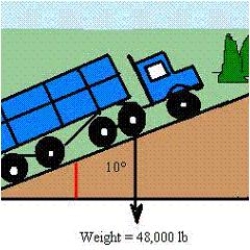
A) 47,070.8 lb
B) 47,436.8 lb
C) 47,313.8 lb
D) 47,270.8 lb
E) 47,280.8 lb
 slope as shown in the figure. Assume the only force to overcome is that due to gravity. Find the force perpendicular to the hill. Round your answer to one decimal place.
slope as shown in the figure. Assume the only force to overcome is that due to gravity. Find the force perpendicular to the hill. Round your answer to one decimal place. 
A) 47,070.8 lb
B) 47,436.8 lb
C) 47,313.8 lb
D) 47,270.8 lb
E) 47,280.8 lb

Unlock Deck
Unlock for access to all 130 flashcards in this deck.
Unlock Deck
k this deck
74
Convert the following point from rectangular coordinates to cylindrical coordinates. Give any angles in radians. 
A)
B)
C)
D)
E)

A)

B)

C)

D)

E)


Unlock Deck
Unlock for access to all 130 flashcards in this deck.
Unlock Deck
k this deck
75
Find an equation in rectangular coordinates for the equation given in cylindrical coordinates. 
A)
B)
C)
D)
E)

A)

B)

C)

D)

E)


Unlock Deck
Unlock for access to all 130 flashcards in this deck.
Unlock Deck
k this deck
76
Find an equation in spherical coordinates for the equation given in rectangular coordinates. 
A)
B)
C)
D)
E)

A)

B)

C)

D)

E)


Unlock Deck
Unlock for access to all 130 flashcards in this deck.
Unlock Deck
k this deck
77
Given  and
and  , find
, find  .
.
A)
B)
C)
D)
E)
 and
and  , find
, find  .
.A)

B)

C)

D)

E)


Unlock Deck
Unlock for access to all 130 flashcards in this deck.
Unlock Deck
k this deck
78
Both the magnitude and the direction of the force on a crankshaft change as the crankshaft rotates. Find the torque on the crankshaft using the position and data shown in the figure. Round your answer to two decimal places. 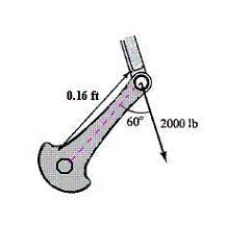
A) 2,771.28 ft-lb
B) 277.13 ft-lb
C) 226.27 ft-lb
D) 554.26 ft-lb
E) 160.00 ft-lb

A) 2,771.28 ft-lb
B) 277.13 ft-lb
C) 226.27 ft-lb
D) 554.26 ft-lb
E) 160.00 ft-lb

Unlock Deck
Unlock for access to all 130 flashcards in this deck.
Unlock Deck
k this deck
79
To carry a 500-pound cylindrical weight, two workers lift on the ends of short ropes tied to an eyelet on the top center of the cylinder. One rope makes a  angle away from the vertical and the other makes a
angle away from the vertical and the other makes a  angle as shown in the figure below. Find the vertical component of each worker's force. Round your answer to two decimal places.
angle as shown in the figure below. Find the vertical component of each worker's force. Round your answer to two decimal places.
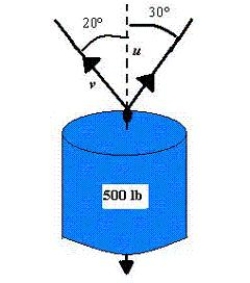
A)
B)
C)
D)
E)
 angle away from the vertical and the other makes a
angle away from the vertical and the other makes a  angle as shown in the figure below. Find the vertical component of each worker's force. Round your answer to two decimal places.
angle as shown in the figure below. Find the vertical component of each worker's force. Round your answer to two decimal places.

A)

B)

C)

D)

E)


Unlock Deck
Unlock for access to all 130 flashcards in this deck.
Unlock Deck
k this deck
80
Find the angle between the vectors for u and v. 
A) 46.88
B) 23.20
C) 66.80
D) 42.59
E) 88.85

A) 46.88

B) 23.20

C) 66.80

D) 42.59

E) 88.85


Unlock Deck
Unlock for access to all 130 flashcards in this deck.
Unlock Deck
k this deck


